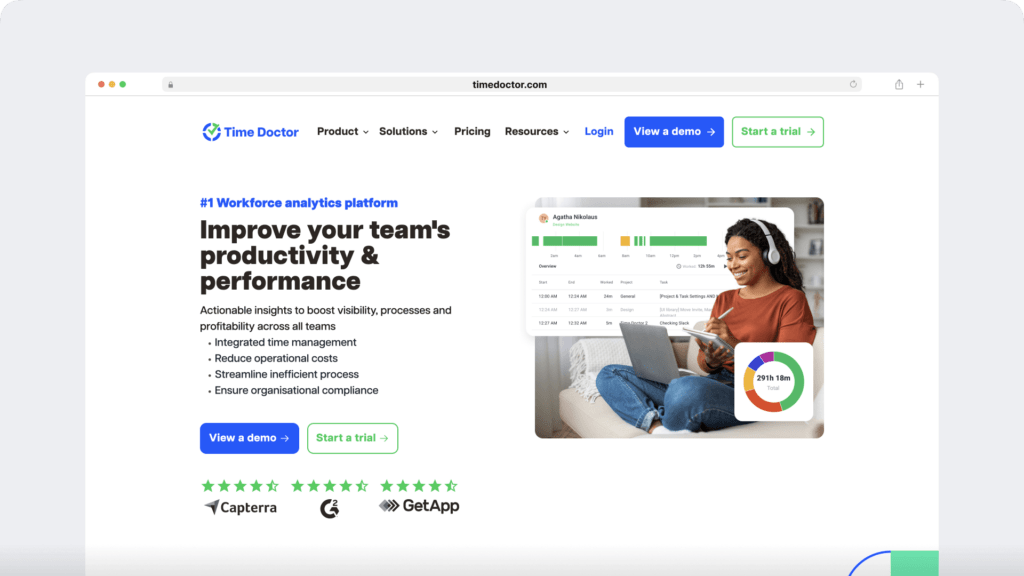Most companies have now outsourced work to India to save costs and scale their business activities.
From giants like Microsoft, Google and IBM to early stage startups… everyone’s doing it!
Are you also thinking of outsourcing to India?
With India’s efficiency and expertise in handling outsourced work, you could be looking at increased profits in no time.
In this article, we’ll cover everything you need to know about outsourcing to India and how to manage your outsourced staff.
Table of Contents
- What is outsourcing?
- About the outsourcing industry in India
- Three commonly outsourced services in India
- Pros and cons of outsourcing to India
- The four steps to start outsourcing to India
Let’s get started.
What is outsourcing?
Outsourcing is an activity where a company hires a third-party to handle its non-core tasks. This includes tasks that don’t have to be performed in-house, like customer support, data entry and more.
Why do companies do this?
Instead of doing the work themselves, they hire third-party service providers to do it for them. This way, they can focus on core activities that are essential to growing their business.
Additionally, as most outsourcing service providers are based in countries where labor is more affordable, companies can benefit from reduced costs too!
Who are these service providers?
Typically, service providers are companies who have dedicated staff to perform the task. For example, you can outsource your software needs to IT companies.
However, with the rise of the gig economy, you can also outsource to freelancers or independent contractors.
About the outsourcing industry in India
India is one of the largest outsourcing markets in the world. Cities like Mumbai, Bangalore, and Hyderabad are often among the top outsourcing destinations in the world. The country is also known as the best IT outsourcing hub!
And the reasons for this?
Access to a large talent pool, lower salaries and support from the National Association of Software Service Companies (NASSCOM) are some reasons why companies prefer outsourcing to India.
We’ll dive into these reasons in a minute.
Three commonly outsourced services in India
While you can outsource almost any non-core task to an Indian service provider, here’s a closer look at some of the most popular ones:
1. Information technology (IT)
No matter which industry you work in, you need IT support in tasks such as:
- Website development
- Technical support
- Software and mobile app development
However, as IT services require specialized knowledge and equipment, you’ll have to train your in-house staff and set up the infrastructure for it. This can be time-consuming and super expensive.
Instead, why not outsource it to the Indian IT industry?
The Indian software industry has the ready infrastructure, specialized knowledge and skilled software developers for the job.
This frees up your time and resources to focus on growing your business. And as most of these companies have been doing this for decades, you don’t have to worry about any dip in the quality of work.
2.Customer support services
Whether you’re running an e-commerce or a software development company, you need to address your customer’s needs and concerns. But answering tons of customer calls and replying to their emails can be very time-consuming and tedious.
So why not outsource it to an Indian service provider?
As it’s not a fairly technical task, you can hire call centers to attend to your customers’ needs. They’ll have all the dedicated staff and technology needed to provide round the clock support. This way, you’re free to focus on core business activities that really need your staff’s inputs.
3. Knowledge process outsourcing (KPO) services
KPO is the outsourcing of tasks that require information processing, like:
- Big-data analytics
- Financial and investment research
- Market research
These are high-end services for which you need to understand the nature of business and process large volumes of information. As establishing this in-house requires lots of time and other resources, it’s best to outsource it to Indian service providers.
What’s the Indian KPO advantage?
By outsourcing to Indian service providers, you get high quality work done by engineers and MBAs without having to deal with finding and recruiting skilled talent. They’ll also have the technology to ensure that your data is accurate and secure.

Pros and cons of outsourcing to India
To help you determine if India is the right outsourcing destination for you, let’s take a look at its pros and cons:
A. Pros
Like the Philippines, India has been a profitable outsourcing destination for hundreds of companies including Silicon Valley giants like Google and Facebook.
Here’s why:
1. Cost-effective
It’s no secret that most companies prefer offshore outsourcing to save costs.
India has a low cost of living compared to other developed countries like the United States. This translates to lower salaries for your outsourced staff. You’d only have to pay a fraction of what you’d have to pay for a US employee!
While that’s a given for any developing country, it isn’t the only reason why companies prefer offshoring to India.
You also benefit from reduced startup cost due to the availability of ready outsourcing infrastructure in India. For example, you don’t have to set up any equipment or technology to perform your IT tasks — the service provider will already have it.
2. Access to a vast pool of skilled talent
The availability of skilled professionals is another reason why companies choose to outsource to Indian service providers.
India churns out a massive number of skilled professionals every year from its many colleges and universities. Most of them are well-versed with world-class business practices and the latest technologies to perform your tasks efficiently.
This ensures that Indian outsourcing firms have access to the right skill sets to consistently deliver quality work.
3. English proficiency
Issues with outsourcing work mostly arise when there is a lack of understanding due to a language barrier.
However, many Indians speak fluent or native-level English since the medium of instruction for most higher education institutions is English.
This way, you’ll have no trouble communicating work requirements with Indian workforces. As they’ll have no trouble talking to your customers and addressing their needs, they’re perfect for your customer support services.
4. Good outsourcing infrastructure
Some outsourcing tasks, such as customer support, require dedicated technology and infrastructure.
Recently, India has seen tremendous improvement in telecom, broadband, power and other infrastructure.
As Indian cities also have the advantage of lower real estate prices, Indian outsourcing firms can offer you quality services at a lower price than most other countries.
B. Cons
While India is one of the top business process outsourcing destinations in the world, there are some drawbacks to outsourcing there:
1. Time zone differences
Most Indians are proficient in English; however, you might still face some communication difficulties.
Why?
While virtual communication tools can help you cross the distance, time zone differences can create a delay in getting the message across.
For example, tools like Slack and Fleep can help you message your outsourced staff, but sometimes you might want to explain things over a video call. However, time differences can make it difficult to organize these calls!
2. Monitoring issues
This is one of the major issues with offshore outsourcing.
When your outsourced staff is working thousands of miles away, it can be challenging to keep tabs on their work activity. You might not know if they’re actually working on your project!
Considering that most outsourcing firms charge by the hour, you need to know how many hours it really took to finish the task. For example, an outsourcing firm could bill you for five hours when it only took three hours to do the job!
Luckily, there’s one way to solve this issue.

The four steps to start outsourcing to India
Wondering how to start outsourcing to India?
Here’s a step-by-step guide to help you out:
1. Learn how the outsourcing industry works in your niche
The first step in outsourcing to India is to understand the outsourcing industry in your niche.
Why should you do this?
The Indian outsourcing industry caters to a large number of different businesses! If you don’t have a clear idea of how the industry functions, it can be difficult to outsource the work to an Indian service provider.
Here’s how to do that:
- Learn about the tasks typically outsourced in your niche.
- Identify the risks involved with outsourcing.
- Find out the measures taken by other firms to mitigate these risks.
This way, you’ll be able to understand the industry before leveraging it for your company.
2. Determine what you can outsource
The next step is to decide what activity you want to outsource to an Indian service provider.
Why should you do this?
Outsourcing is not just about saving money. You need to know what tasks you are willing to cede control over by outsourcing them.
However, you shouldn’t outsource your core business activities!
For example, if you’re good at digital marketing, you do not want to outsource that.
So how do you decide what to outsource?
Here’s how:
- Identify what non-core tasks your business is lacking in.
- Think about the resources spent on these tasks.
- Decide if you’re willing to give control over that task to a third-party entity.
This way, you’ll have a better understanding of what you’re willing to outsource.
3. Partner up with a service provider
With hundreds of firms catering to your niche, you must make an informed choice while choosing an outsourcing firm.
Remember, this firm will be an essential part of your business, just like your in-house employees.
Here are a few pointers to keep in mind:
- Evaluate outsourcing companies as strictly as you would evaluate potential employees.
- Look for reviews and ask your peers for peers in the industry.
- Choose someone with a stellar work record and sufficient industry expertise.
While choosing an outsourcing partner is not easy, here’s a look at some Indian companies that offer outsourcing services:
1. Triniter

Triniter is known for providing high-quality yet affordable BPO call center services. They have been helping top companies with inbound customer and back-office support for a decade.
Key BPO services:
- Customer support services
- Back-office and technical support services
- AI and data management services
2. DataPowerHub

DataPowerHub is specialized in any type of data related and internet research services such as data entry, data processing, data mining, data management, internet and web research. If they don’t maintain 100% accuracy, they mentioned they will give you double the money you paid for their services. They are one of the top data entry service providers in the world.
Key BPO services:
- Data Entry
- Data Processing
- Data mining and data management
- Web and internet reserach
3. AppTechub

AppTechub is a famous outsourcing partner in India. They have the highest clients’ retention and repetition rate of around 97%. They also have the most outrageous guarantee, that is, if they don’t exceed your service-level expectation, they will give you 200% of the payment you paid them. No questions will be asked.
Key BPO services:
- Web app development services
- Mobile app development services
- Customer software development services
4. Tata Consultancy Services (TCS)

Tata Consultancy Services (TCS) runs one of the biggest outsourcing firms in India. It’s largely popular for handling business processes such as supply chain management. TCS has a strong workforce of over 35,000 employees in India.
Key BPO services
- Information technology
- Finance and accounting
- Legal process management
- Customer support
5. Wipro

Wipro is an Indian BPO giant with a presence in over 15 cities. It’s known for handling
IT-enabled services (ITES) for other companies.
Key BPO services
- Human resources management
- Customer support
- Information technology
- Procurement services
6. Infosys

Infosys is a popular service provider that mainly offers digital business solutions. Present in cities like Bangalore, Hyderabad and Mumbai, the company has over 43000 employees.
Key BPO services
- Customer services
- Legal process management
- Finance and accounting
- Sales and fulfillment
4. Use the right tools
The main problem with outsourcing is that, as your outsourced staff could be thousands of miles away, how do you:
- manage projects and share relevant files with them?
- communicate effectively?
- monitor your outsourced team during work hours?
Luckily, you only have to invest in the right set of tools to avoid these issues.
Here’s a look at the different types of tools you’ll need when outsourcing to India:
A. Project management tools
With your project taking place remotely, you need a platform to:
- Delegate tasks to your outsourced staff.
- Share and store relevant files.
- Monitor the project progress
With the right project management tool, you could do all this and more!
Look for tools that have features like:
- Dashboard for quick overviews of the project progress.
- Task priorities to help you prioritize urgent tasks.
- Integrations to ensure it works with your other workplace software.
Some good project management tools include ClickUp, Wrike, Jira and Workzone.
B. Communication tools
Communication plays a vital role in ensuring that your outsourced project is on track. You need tools that help you communicate project demands and progress to your remote teams.
How do you do that?
Use Messaging Tools.
Tools like Fleep and Slack are extremely easy to use. They allow you to:
- Have team-specific conversations.
- Update team members on the task progress.
- Integrate with other workplace software.
Use Video Calling Tools:
Zoom and Skype are well-known video calling tools that let you:
- Hold project meetings with your team.
- Communicate using audio and video.
- Share work screen for detailed task discussions.
C. Performance monitoring tools
Monitoring work progress is critical for outsourcing any activity.
After all, you need to hold the service provider accountable for any delays or issues in the project.
Without monitoring, you won’t be able to accurately know:
- How long has the outsourced staff worked on your project?
- If they’re passing off idle-hours as work hours?
- If your projects actually took that long to complete?
Luckily, you can use a performance monitoring tool like Time Doctor to monitor your outsourced staff.
What’s Time Doctor?
Time Doctor is a powerful employee monitoring tool that’s used by large companies as well as by small companies. It lets you:
- Accurately track the hours your outsourced staff worked on your projects or tasks.
- Prevent them from getting distracted with irrelevant websites and apps like social media.
- Ensure that they are actively working on your project and not billing you for idle hours.
- Know if someone accesses a website or app that violates company policies.
- Track time across software like project management, communication and invoicing tools.

Conclusion
Outsourcing to India is one of the quickest ways to save costs while ensuring that you get high-quality work done.
However, you need to carefully chalk out a plan before partnering up with any Indian outsourcing service provider. Conduct in-depth research about the industry and the companies we covered here to get a head start.

Andy is a technology & marketing leader who has delivered award-winning and world-first experiences.


